Introduction
In the rapidly evolving landscape of technology, Amazon Web Services (AWS) stands out as a transformative force in cloud computing. Since its inception in 2006, AWS has revolutionized the way businesses operate, offering an extensive suite of services that cater to a diverse range of organizational needs.
From scalable computing power and storage solutions to advanced machine learning and artificial intelligence capabilities, AWS empowers companies to innovate without the burden of significant upfront costs. As organizations increasingly seek reliable and efficient cloud solutions, understanding the breadth of AWS’s offerings and the myriad benefits it provides is essential for navigating the complexities of modern business.
This article delves into the key features, advantages, and real-world applications of AWS, highlighting its role as a pivotal resource for companies aiming to thrive in a competitive marketplace.
An Overview of Amazon Web Services (AWS)
Amazon Cloud Computing Services, provided by Amazon Web Services (AWS), is a comprehensive computing platform that offers a wide range of services to assist companies in scaling and expanding. Launched in 2006, AWS has become a leader in the services market by providing Amazon cloud computing services that range from computing power and storage to machine learning and artificial intelligence. The platform is designed to meet the diverse needs of organizations, enabling them to deploy applications quickly and efficiently without the need for significant upfront investments in hardware.
By utilizing AWS, organizations can improve their operational efficiency, lower expenses, and innovate more swiftly, all while gaining from the scalability and adaptability that online computing provides.
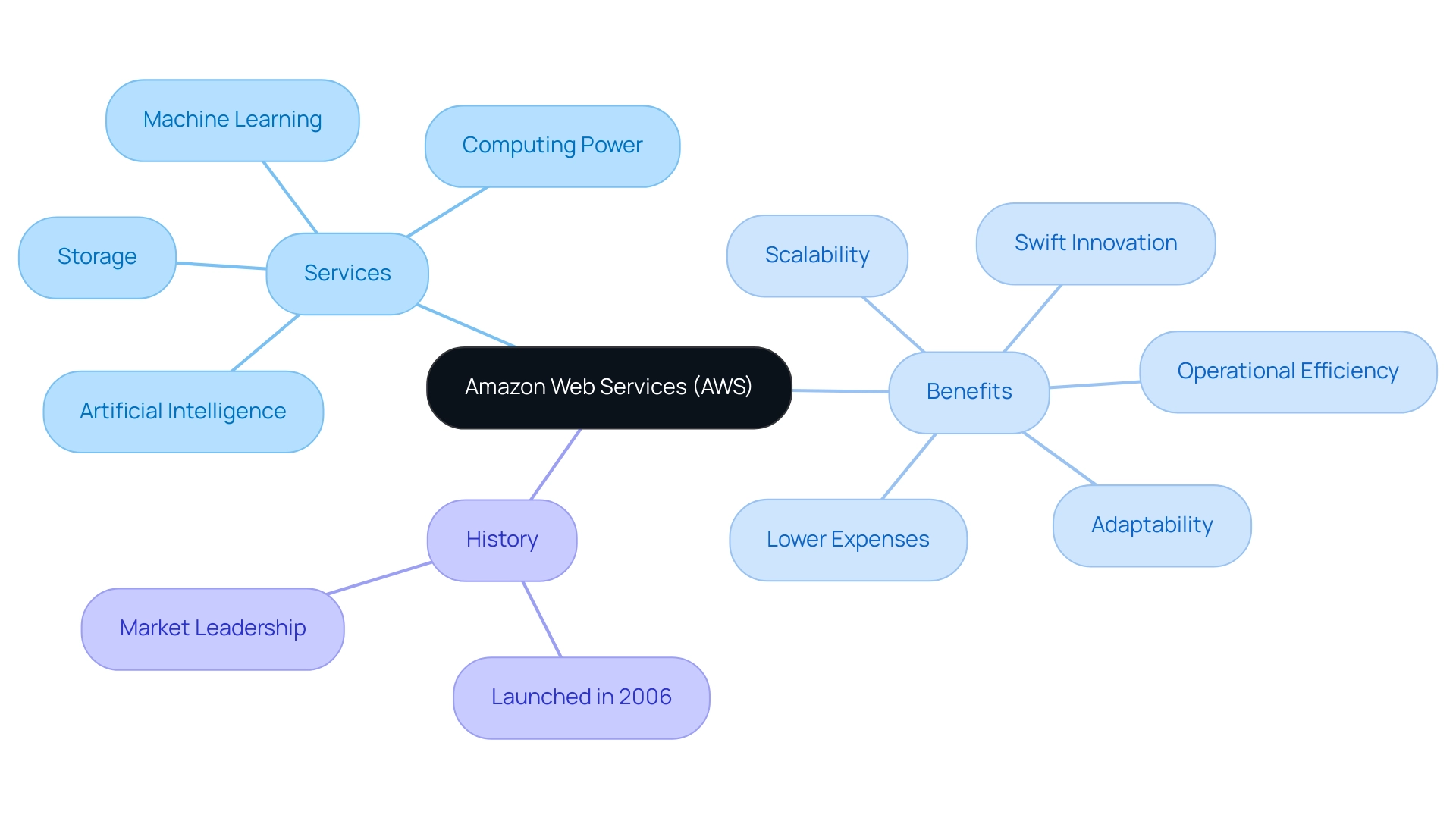
Exploring the Range of AWS Services and Support Options
Amazon Cloud Computing Services provide an extensive array of offerings designed to meet diverse business needs, including core services such as:
- Computing with Amazon EC2
- Scalable storage solutions via Amazon S3
- Robust database management through Amazon RDS
Networking capabilities, exemplified by Amazon VPC, also enhance operational efficiency. Furthermore, AWS excels in managed services, providing Amazon Cloud Computing Services like:
- AWS Lambda for serverless computing
- Amazon ECS for container orchestration
These services streamline application development and deployment processes.
It's important to note that security remains a paramount concern, with 79% of respondents identifying it as the second-biggest issue when choosing a service provider. Support options are comprehensive, comprising various AWS Support plans that guarantee 24/7 access to technical assistance, a wealth of training resources, and best practices for effective adoption. In 2022, AWS announced over $30 million to help early-stage startups led by underrepresented founders, reflecting its commitment to fostering innovation and diversity.
Furthermore, the expansion of online gaming demonstrates AWS's considerable influence in particular sectors, as shown by a projected rise in the global online gaming market from $2.38 billion in 2022 to $8.17 billion by 2025, with an estimated 293 million online gamers globally. This expansive service portfolio, which features Amazon Cloud Computing Services, empowers organizations to customize their strategies, ensuring that they can innovate and scale effectively while receiving the essential support throughout their journey. The continual updates and enhancements to Amazon Cloud Computing Services in 2024 further solidify its position as a leading cloud provider, catering to the evolving demands of enterprises across different sectors.
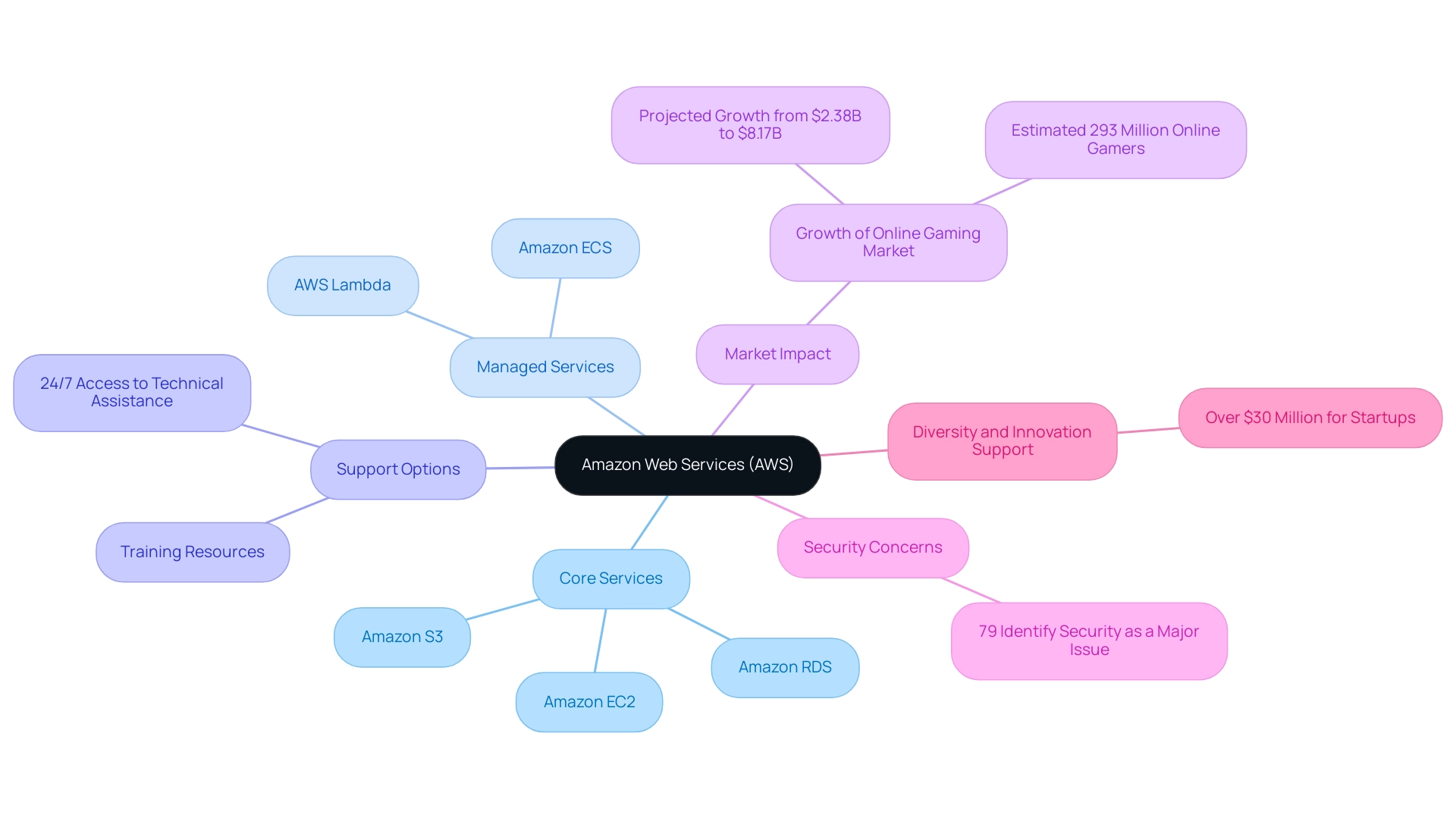
The Benefits of Using AWS for Businesses
Leveraging Amazon Cloud Computing Services presents a multitude of advantages for organizations, particularly in terms of cost efficiency, scalability, and operational flexibility. The pay-as-you-go pricing model enables organizations to minimize upfront capital expenditures by only incurring costs for the resources they utilize. This approach not only results in substantial cost reductions but also aligns with the dynamic nature of market demands.
Notably, the amazon cloud computing services provided by AWS offer scalable resources to meet increased traffic demands, allowing for seamless adjustments to resource allocation. This ensures that companies can effectively manage traffic fluctuations without the risk of overcommitting resources. Furthermore, AWS's expansive network of global data centers facilitates the deployment of applications closer to end-users, thereby optimizing performance and enhancing the overall user experience.
As mentioned by AWS, it allows organizations to choose their own preferred database, programming language, operating system, and various other resources and assets, which underscores its flexibility. The extensive array of amazon cloud computing services available on AWS empowers organizations to innovate at an accelerated pace by integrating cutting-edge technologies such as artificial intelligence, machine learning, and the Internet of Things (IoT), all while avoiding substantial initial investments in infrastructure. As per a case study named 'The Key Advantages of AWS Cloud for Businesses,' AWS's scalability and flexibility make it especially appropriate for small and medium enterprises, allowing them to handle increasing data storage requirements and optimize operations.
The combination of these features positions AWS as a pivotal resource for companies seeking to thrive in a competitive marketplace.
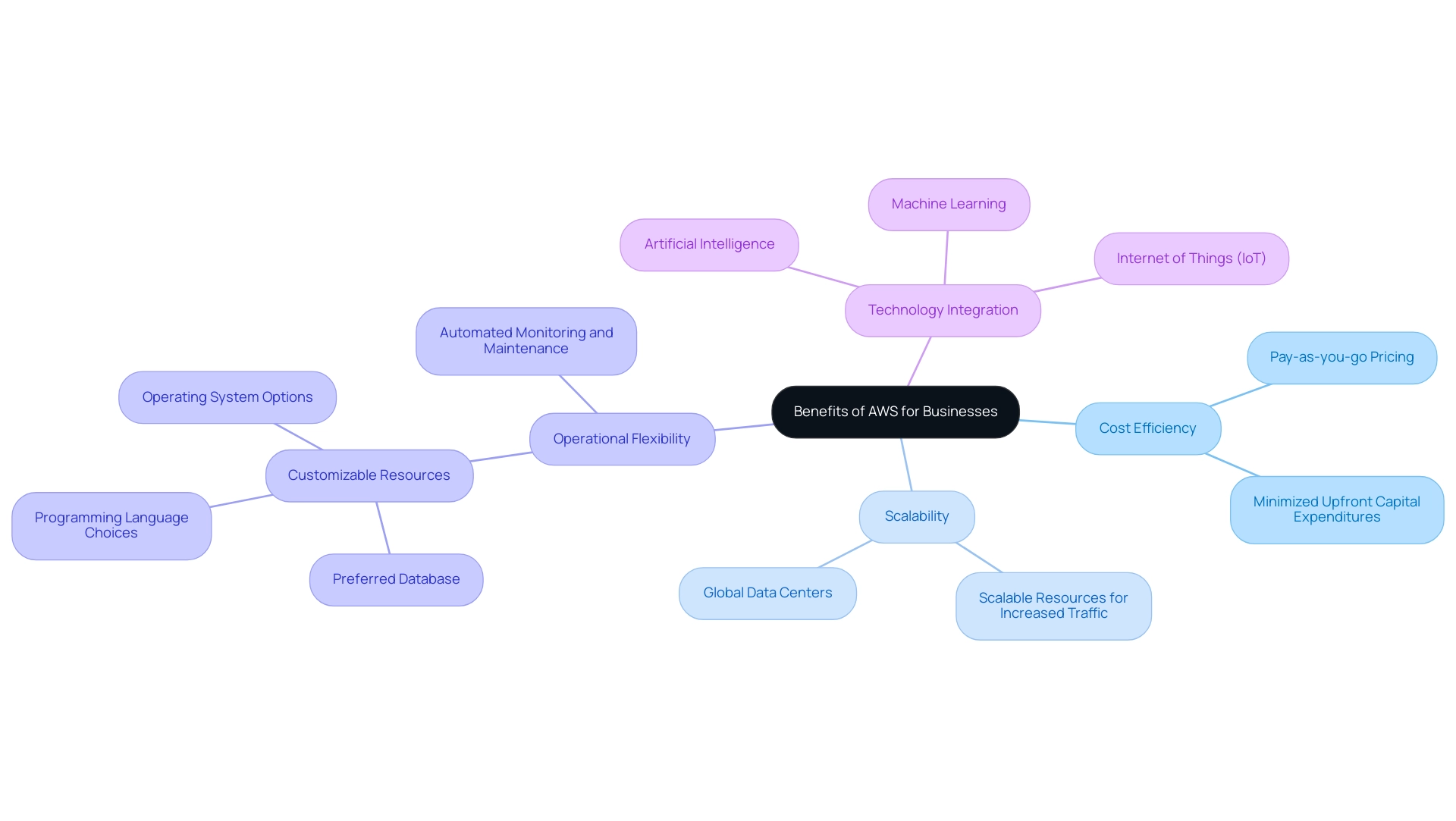
Security and Compliance in AWS
AWS prioritizes safety by offering an extensive suite of Amazon cloud computing services designed to protect data and applications. Key protective features include:
- Identity and access management (IAM)
- Encryption
- Advanced network protection protocols
As of 2024, AWS boasts a comprehensive array of over 50 protective features, enabling organizations to tailor their defensive posture to meet unique requirements.
A relevant example of AWS's necessity is seen in Los Angeles's switch to AWS, prompted by server room temperatures exceeding 100 degrees last summer. Compliance with critical regulatory standards such as GDPR, HIPAA, and PCI DSS further establishes Amazon cloud computing services by AWS as a trusted platform for businesses in regulated industries. Richard Daly, CEO of DNAnexus, notes,
With AWS, enterprises worldwide can perform genomic analysis and clinical studies in a secure and compliant environment at a scale not previously possible.
This highlights the capability of Amazon cloud computing services to not only support data protection but also facilitate advanced analytics in sensitive fields. Furthermore, the shared responsibility model is fundamental to the protection framework of Amazon cloud computing services. Under this model, AWS oversees the protection of the cloud infrastructure, while customers maintain responsibility for safeguarding their applications and data within the cloud.
This cooperative method is essential for upholding compliance and enhancing safety outcomes. A case study named 'Scaling with AWS' demonstrates how a company expanded to accommodate over 3 million new users in merely three weeks while ensuring internal data protection through AWS features. The company reported peace of mind regarding storage management due to AWS's capabilities.
Recent updates to AWS compliance features, specifically tailored for GDPR and HIPAA, further enhance the reliability of Amazon cloud computing services in meeting regulatory standards. As organizations increasingly transition to online solutions, the peace of mind provided by AWS's robust security measures and compliance capabilities becomes an invaluable asset.
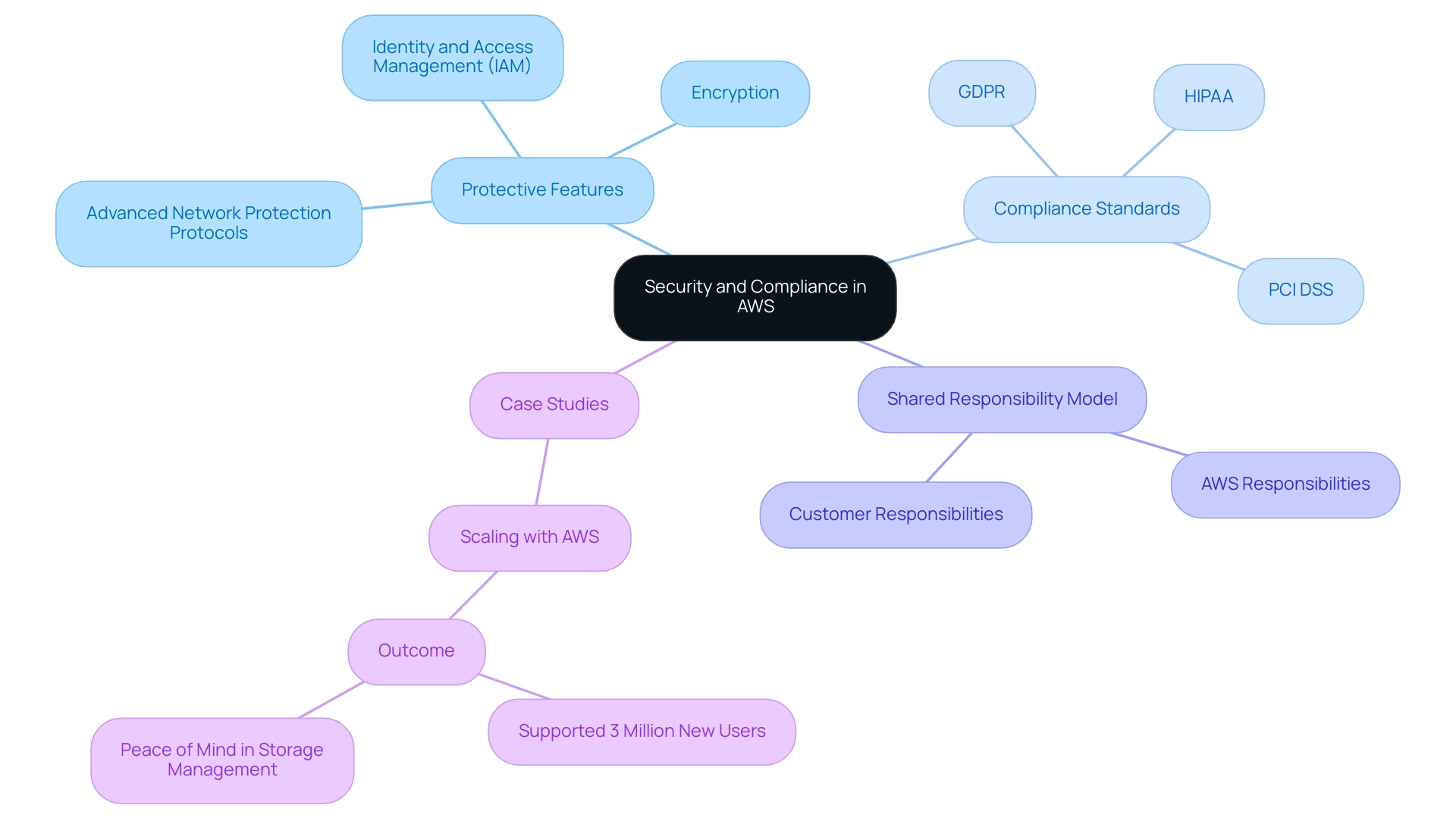
Real-World Applications of AWS
Numerous organizations across various industries have successfully adopted Amazon cloud computing services to enhance their operations. For instance:
- Netflix relies on AWS for its streaming services, utilizing the platform's scalability to handle massive amounts of data and user traffic.
- NASA uses AWS to store and analyze data from its Mars rover missions, leveraging the cloud's computing power to process complex datasets efficiently.
Additionally, companies like:
- Airbnb
- Dropbox
have harnessed AWS's capabilities to manage their infrastructure, allowing them to focus on their core business while ensuring high availability and performance. These examples illustrate how Amazon cloud computing services can drive innovation and efficiency across diverse sectors, making them a preferred choice for organizations worldwide.
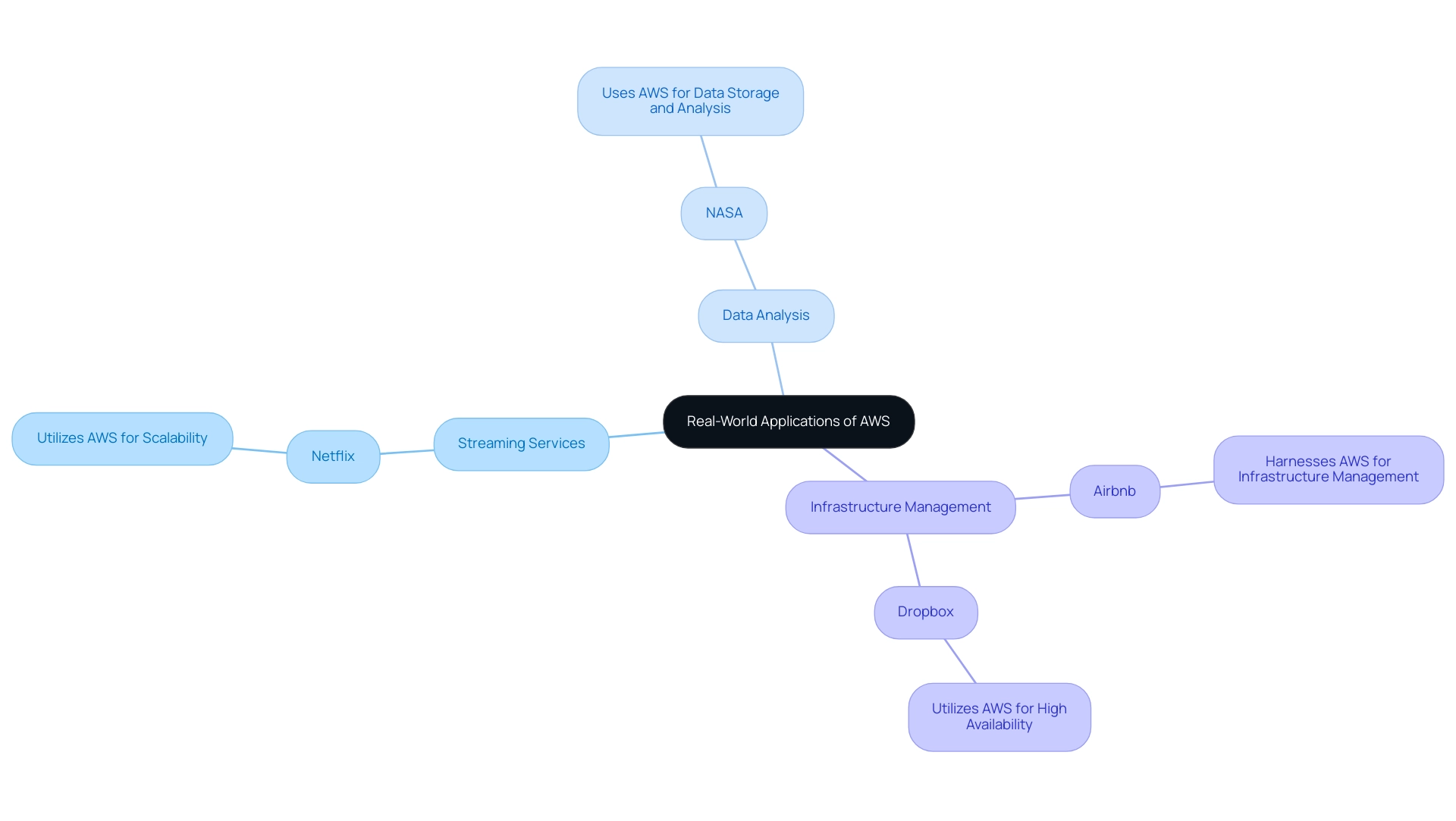
Conclusion
Amazon Web Services (AWS) has emerged as a critical player in cloud computing, providing a vast array of services that meet the diverse needs of organizations. Since its inception in 2006, AWS has enabled businesses to enhance operational efficiency through scalable computing power, flexible storage solutions, and advanced machine learning capabilities without incurring significant upfront costs.
The advantages of AWS are clear, particularly its pay-as-you-go pricing model, which allows organizations to optimize expenses while adjusting resources based on demand. This flexibility is further supported by a global network of data centers that ensures optimal application performance for end-users.
Security and compliance are paramount within the AWS framework, featuring comprehensive security measures designed to protect sensitive data. The shared responsibility model reinforces AWS's commitment to security, allowing businesses to tailor their security strategies to meet regulatory requirements.
Real-world applications of AWS, such as those by Netflix and NASA, highlight its transformative impact across various industries. These examples demonstrate how AWS drives both operational efficiency and innovation.
In summary, AWS stands as an essential resource for organizations navigating the complexities of the cloud. By leveraging its extensive capabilities, businesses can achieve greater efficiency, security, and innovation, positioning themselves for success in a competitive landscape.




